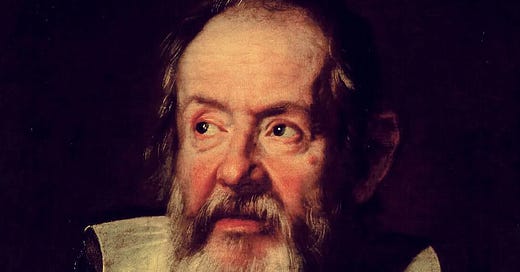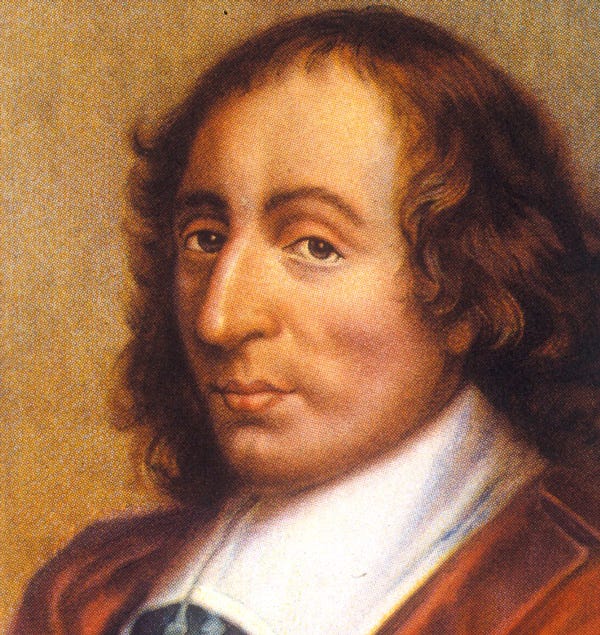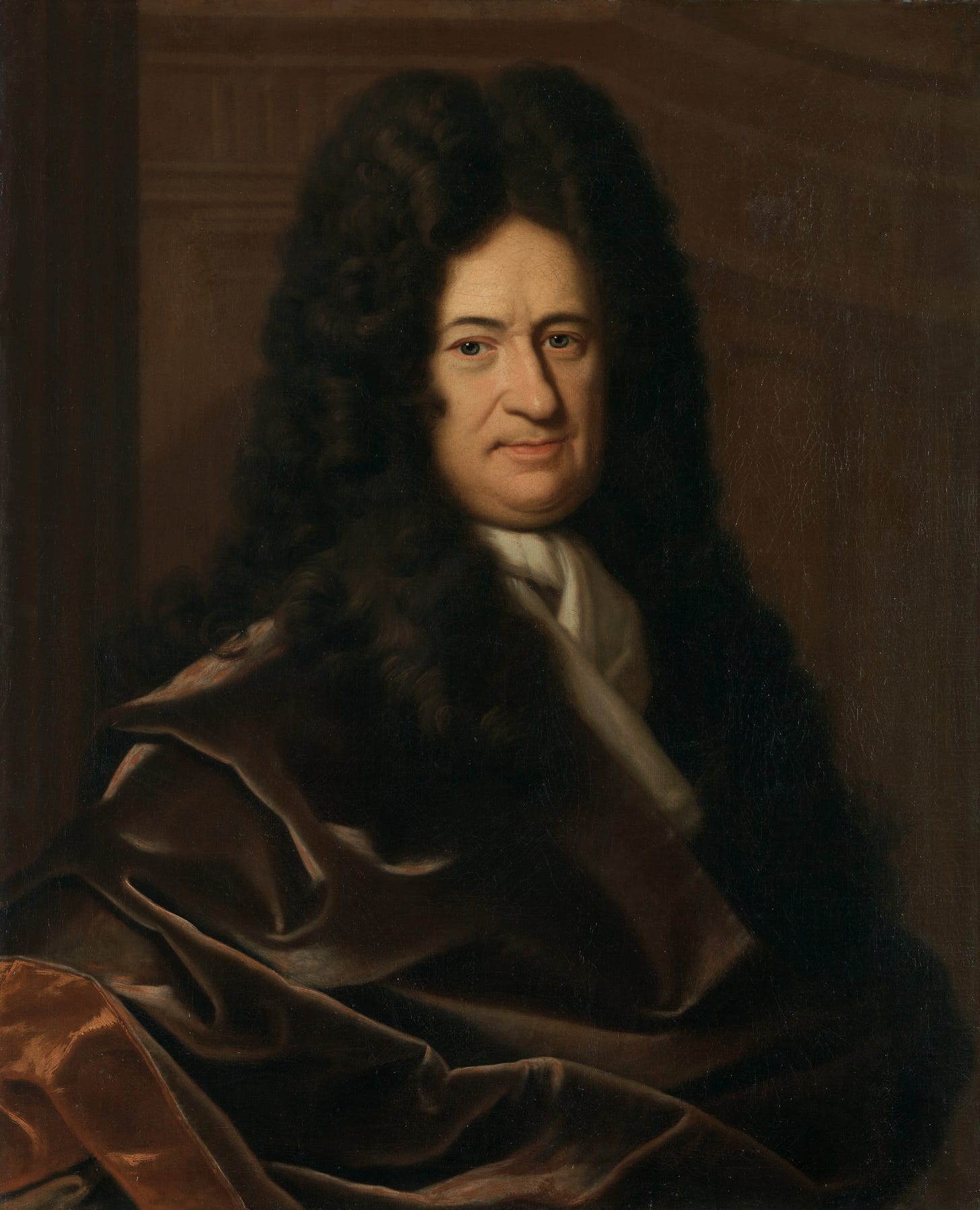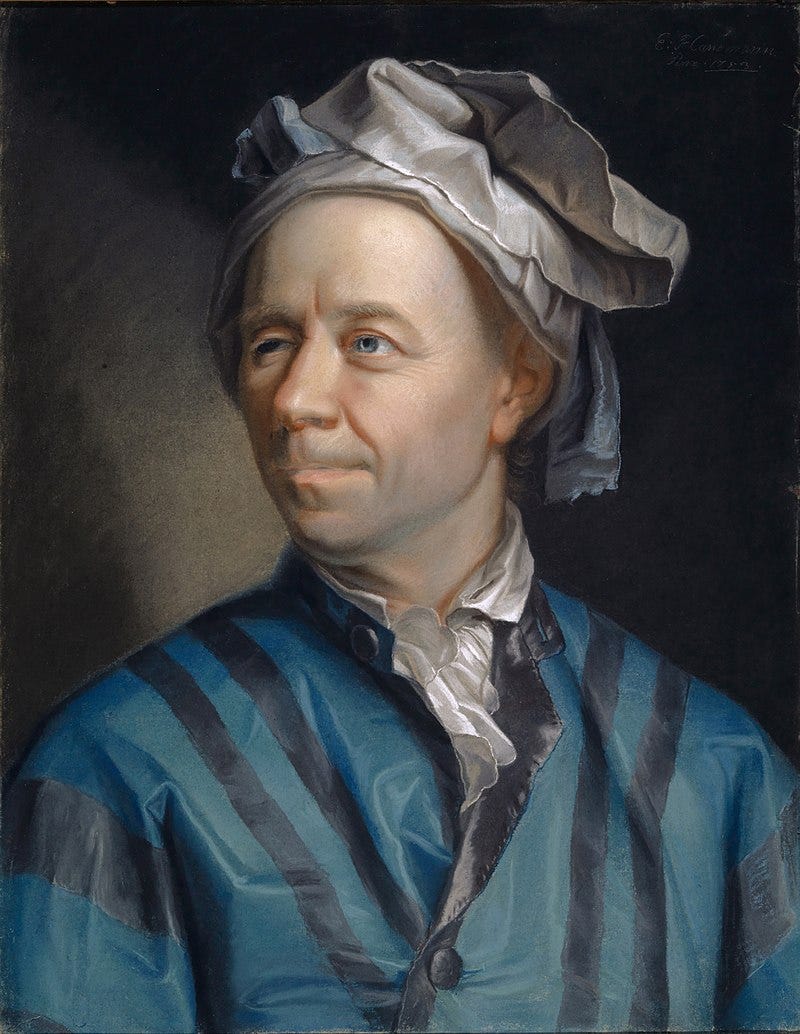These really aren’t in any particular order. I just find that stuff like this gets more attention when you put it in a top-ten list.
Here we go!
#10 Galileo Galilei (1564 - 1642)

Galileo definitely deserves a spot in the top ten, despite his legendary dust-up with the Church. He popularized the use of mathematics in experimental science, cleverly timing his experiments using his own heartbeat. We also have Galileo to thank for basically inventing observational astronomy when he thought to point a spyglass (telescope) at the heavens (no word on whether he yelled “Land ho!” when he first saw the Moon). He also came up with the principles of relativity and inertia, which are both kind of big deals in physics. Though his dogged devotion to heliocentrism and his somewhat unpolished personality got him in hot water with powerful religious people, like his friend Pope Urban VIII, he did manage to occasionally be highly quotable about God:
“I do not feel obliged to believe that the same God who has endowed us with senses, reason, and intellect has intended us to forgo their use and by some other means to give us knowledge which we can attain by them.” [His letter to the Grand Duchess Christina in 1615]
Darn straight, Galileo.
#9 Blaise Pascal (1623 - 1662)
Ever hear of Pascal’s wager? Paraphrased: “You’re better off covering all your bases by believing in God than not.” Blaise Pascal is the guy who came up with that.
In addition to producing a famous probabilistic argument for belief in God that’s been misunderstood by Christians and atheists alike for hundreds of years, Pascal was a mathematical prodigy who made significant contributions to physics, including fluid dynamics, and even influenced the development of modern economics through probability theory. A fun story I like to tell my students about Pascal is that his father, Étienne, decided that Pascal was not allowed to learn any math before the age of 15, likely making him the envy of French kids everywhere. This apparently backfired, though, because young Pascal was so curious about math that he taught himself at the age of 12, becoming ridiculously good at it in the process.
Anyway, here’s a wordy but quotable bit of his wager argument for believing in God:
“Wager, then, without hesitation that He is. ... There is here an infinity of an infinitely happy life to gain, a chance of gain against a finite number of chances of loss, and what you stake is finite. And so our proposition is of infinite force when there is the finite to stake in a game where there are equal risks of gain and of loss, and the infinite to gain.” [Pensées (Thoughts), 1670]
#8 Robert Boyle (1627 - 1691)

Like most famous scientists from the olden days, Boyle was a man of many talents. He’s known not only for being the first modern chemist, but for his work in physics, and for being a pioneer of a little thing known as the modern scientific method. He was reportedly a very diligent and scrupulous experimenter who could be counted on to report on the results of experiments with great honesty.
Boyle has a physical law named after him (you guessed it, Boyle’s law) and he also discovered the element phosphorus. Like many of the other scientists who made this list, Boyle was a devoted Christian who wrote a great deal on theology. He was known as an apologist for Christianity, and believed that the practice of science was important for glorifying God. He was just such an upstanding person that I couldn’t find anything funny to say about him. And rather than quoting Boyle, I’ll illustrate the kind of person he was by quoting historian Michael Hunter:
“The central fact of Boyle’s life from his adolescence onwards was his deep piety, and it is impossible to understand him without doing justice to this.” [Oxford Dictionary of National Biography, 2004]
#7 Gottfried Leibniz (1646 - 1716)
Leibniz is one of those people who, when you read about his many achievements, inspires you to feel really bad about yourself. There isn’t enough room in this paragraph to list all of the fields to which he contributed, so I’ll just list a few: mathematics, physics, the history of philosophy, the history of mathematics, theology, ethics, politics, law, history, philology, games, music, and even library science.
Leibniz had been a child genius who, owing to his late father’s large collection of books in Latin, became so proficient in the ancient language that at an age when most of us were guffawing over Archie comics, he managed to produce 300 hexameters of Latin verse in a single morning for a school event. I dunno about you guys, but that’s the kind of thing that got you beat up in my middle school. But as mature, grown adults we can now look on such accomplishments with admiration, as well as annoyance.
Leibniz is probably best known for inventing calculus at about the same time as Isaac Newton. And, like Newton, he also wrote quite a bit about theology, including:
The ultimate reason of things must lie in a necessary substance, in which the differentiation of the changes only exists eminently as in their source; and this is what we call God. [Philosophical Investigations, 1670]
I haven’t the foggiest idea what that means, but it sounds smart, so I quoted it.
#6 Leonhard Euler (1707 - 1783)
If, like me, you’re of a certain age, you look at this portrait of Euler and wonder if Tim Conway thought it would be hilarious to travel back in time, put a tea towel on his head, and pretend to be a famous mathematician for a slightly dubious portrait painter who had agreed to capture his likeness for posterity.
I jest. It’s my way of coping with the existence of yet another of these polymath Christians who managed to be more accomplished in one modest lifetime than I would’ve been in ten lifetimes.
Here are just some of Euler’s occupations: mathematician, physicist, astronomer, geographer, logician, and engineer. He is best known for his pioneering work in mathematics, including coming up with what is widely regarded as the most elegant equation in the entire universe:
I guess you have to be a nerd to appreciate that.
Just trust me that Euler is considered one of the greatest mathematicians of all time. It would take an entire article just to list all of his accomplishments and contributions to the field of mathematics, including his hundreds of publications, so instead I’ll encourage you to look them up yourself, if you’re in the mood to feel like a total loser.
An odd bit of trivia about Euler: He died from a brain hemorrhage right in the middle of a conversation with a colleague about the newly discovered planet Uranus. I like to think that, moments earlier, he’d made a comment about Uranus’ discovery being “mind-blowing.” (I’m truly sorry for that disrespectful joke, as well as for the Tim Conway comparison. I was hoping it would distract you all from making the usual Uranus jokes. Please note that my respect for Euler is immense. The man was a rockstar.)
As if Euler’s prodigious accomplishments weren’t enough, he also happened to come up with one of the best explanations for why we should submit to the will of God with pleasure:
“To [Scripture] belongs in particular the doctrine of both general as well as particular divine providence, through which we can recognize that we can never get into any circumstance where God did not expressly place us according to his infinite wisdom and goodness, and can come to the firm assurance that not a single hair may fall from our head without the will of our heavenly Father. Now if only we were to ponder this doctrine with the appropriate attention and apply it to ourselves, we would submit to the will of God under all circumstances without difficulty and even with pleasure, and in this way attain true happiness.” [Defense of the Divine Revelation against the Objections of the Freethinkers, 1747]
*sigh*
And there you have it, friends. Part 1 of my arbitrarily-ordered top-ten list of Christian scientists. Part 2 coming next week.







